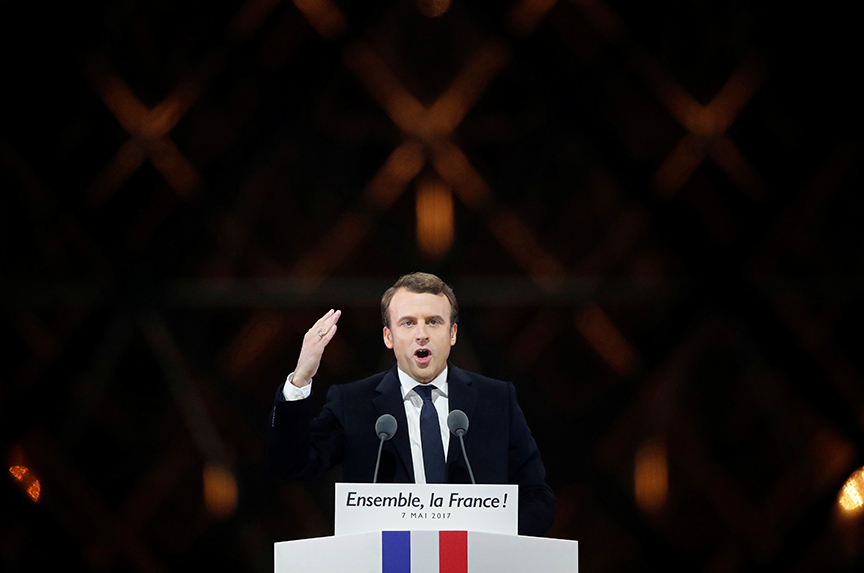 Emmanuel Macron’s election as the next president of France is positive news for Saudi Arabia and Qatar. Among the four leading candidates in the presidential election, Riyadh and Doha most favored Macron, whose foreign policy positions are pro-European Union (EU) and who is expected to continue Paris’ overall approach to international affairs. More specifically, Macron’s victory will likely preserve France’s relationships with Saudi Arabia and Qatar, which have deepened under outgoing French President François Hollande and his predecessor, Nicholas Sarkozy.
Emmanuel Macron’s election as the next president of France is positive news for Saudi Arabia and Qatar. Among the four leading candidates in the presidential election, Riyadh and Doha most favored Macron, whose foreign policy positions are pro-European Union (EU) and who is expected to continue Paris’ overall approach to international affairs. More specifically, Macron’s victory will likely preserve France’s relationships with Saudi Arabia and Qatar, which have deepened under outgoing French President François Hollande and his predecessor, Nicholas Sarkozy.
A victory for Macron’s rival, far-right National Front candidate, Marine Le Pen, would have been bad news for France-Gulf Cooperation Council (GCC) relations. Her foreign policy agenda entailed aligning Paris more closely with Moscow on regional issues, chiefly Syria, where Russia and the GCC’s interests have clashed. Le Pen also frequently accused Saudi Arabia and Qatar of supporting the Islamic State in the Iraq and Syria (ISIS) and al Qaeda. A Le Pen victory could have severely reversed the growth of French-GCC relations.
Syria and Iran policy
Le Pen spoke of Syrian President Bashar al-Assad’s secular regime as one of France’s natural allies, emphasizing France’s Christian identity and the West’s struggle against radical Islam, while viewing the entire Syrian armed opposition as terrorists. Her campaign condemned France’s “aggressive” and “unjust” choices toward Iran and Syria, and blamed Saudi Arabia and Qatar for prolonging Syria’s civil war.
Macron has argued that defeating ISIS in cooperation with Russia, and not toppling Assad, should be at the top of Paris and the EU’s agenda in the Middle East. Nonetheless, he disagrees with Le Pen’s calls for a rapprochement with the Assad regime. Macron has said an alliance with Assad would be “a diplomatic and moral mistake,” suggesting that he, more or less, favors France’s current foreign policy toward Syria: fight ISIS while supporting limited action against the Damascus regime and calling for Assad’s departure from power.
In April, Macron distinguished himself from Le Pen on Syria in a way which Riyadh and Doha strongly approved. Shortly before the US military responded to a chemical weapons attack in Syria with the launch of fifty-nine cruise missiles at a regime air base near Homs on April 7, Macron demanded international military intervention—albeit within the framework of a “diplomatic and political roadmap”—in Syria if Assad is proven guilty of carrying out the chemical weapons attack.
Following the US strikes, which Le Pen criticized, Macron declared that “the Syrian people have an enemy: Bashar al-Assad.”
Ultimately, Macron’s actual Syria policy is unclear. Nonetheless, the president-elect’s stated stand aligns more closely with Riyadh and Doha’s compared with that of Le Pen, who would have essentially allied Paris with Damascus and Moscow, and significantly, Tehran, as well.
Religion, terrorism, and extremism
National security and an anti-Muslim narrative were prominent pillars of Le Pen’s campaign. Salafist jihadist terrorism in France, which has shifted the country’s political landscape to the right since attacks in 2015, gave Le Pen’s presidential bid momentum. According to Le Pen, such terrorism has a home address: Saudi Arabia and Qatar.
Following the Charlie Hebdo attack in January of 2015, Le Pen articulated her plans for enhancing France’s national security with clear foreign policy implications. “We have to review our foreign policy and stop rolling out the red carpet for countries we know to be funding fundamentalism, countries like Saudi Arabia and Qatar,” she said.
In 2013, Le Pen accused Doha of being allied to Salafist terrorist factions in northern Mali.
In 2012, a political spat erupted in France after Qatar created a fund for businesses in underserved and predominantly Muslim suburbs of Paris that have been hit hard by the global economic crisis of 2008-2009. Despite Qatar promoting itself as a humane actor seeking to alleviate suffering among Muslims worldwide, many in the French government were suspicions of Doha’s motives.
Unsurprisingly, Le Pen was one of the French politicians who opposed Qatar investing in Parisian neighborhoods, which have a history of tense relations with French authorities. “It’s suspicious because we are letting a foreign country cherry-pick its investment based on the religion of this or that segment of the population,” Le Pen said at the time.
France and the GCC
France and the GCC grew closer during Hollande’s presidency. Although the United States remains Saudi Arabia’s top arms supplier, France has recently become an increasingly important seller of weapons to the kingdom as a result of the war in Yemen.
With Macron as France’s next president, officials in Riyadh and Doha will likely find a centrist leader who will seek to strengthen Paris’ ties with the GCC in pursuit of solutions to Middle Eastern crises and more lucrative arms deals.
Giorgio Cafiero is the CEO of Gulf State Analytics (@GulfStateAnalyt), a Washington, DC-based geopolitical risk consultancy.
Theodore Karasik (@TKarasik) is a senior advisor at Gulf State Analytics.
Image: French President-elect Emmanuel Macron celebrated his election at a victory rally near the Louvre in Paris on May 7. (Reuters/Christian Hartmann)
